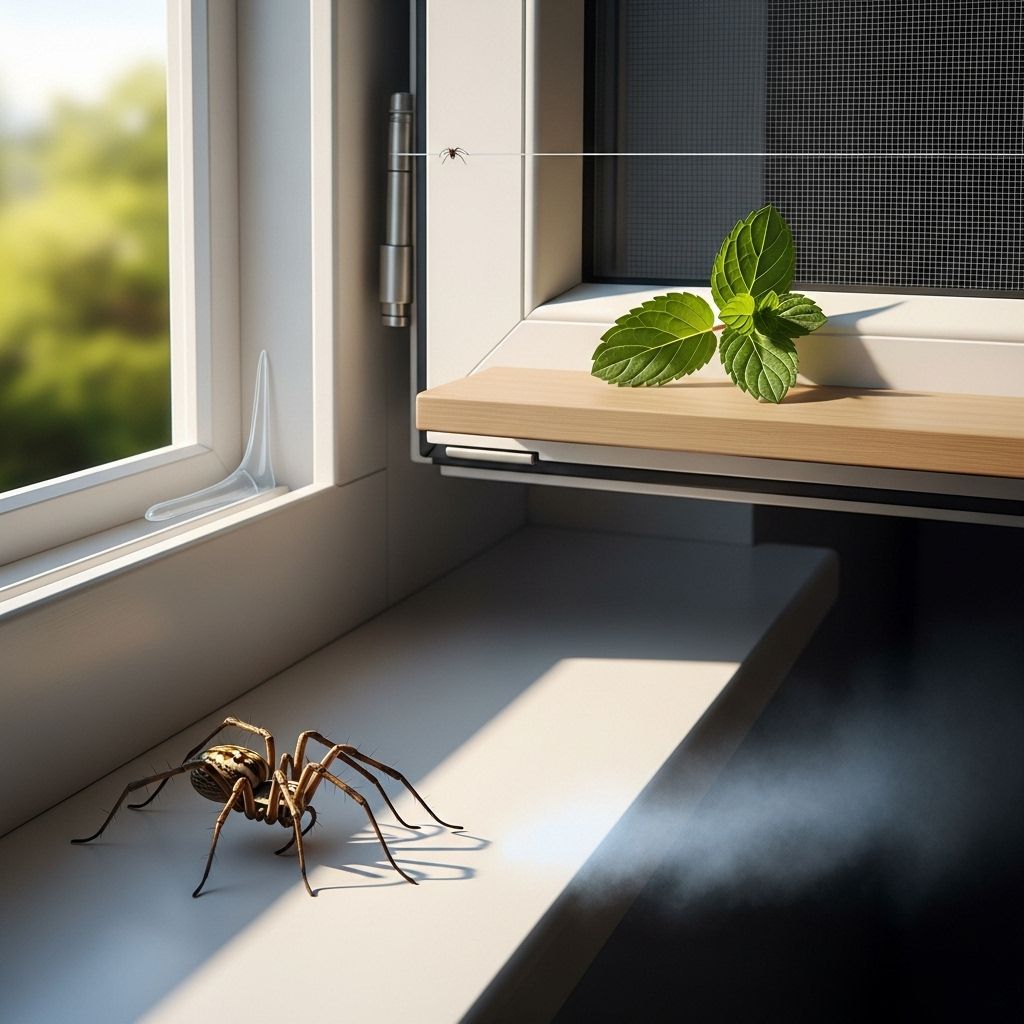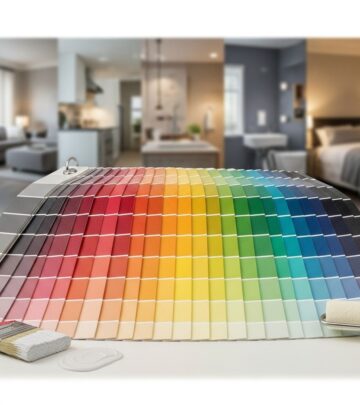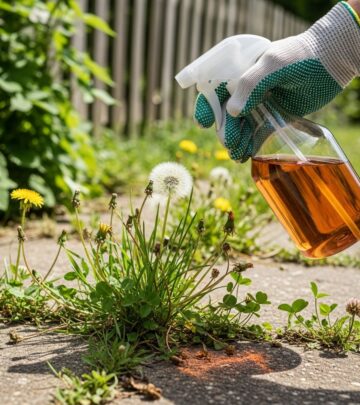How to Get Rid of Spiders and Keep Them Out of Your House
Create a home that’s unfriendly to eight-legged intruders with simple lasting solutions.

Spiders, for many homeowners, are unwelcome guests. Whether you have a strong aversion to these eight-legged creatures or simply want to ensure your home stays as pest-free as possible, knowing how to get rid of spiders – and keep them out – is a priority. This comprehensive guide will explain how to safely remove spiders from your home, discuss which species are dangerous, and outline both chemical and natural strategies to keep spiders from returning. You’ll also find answers to frequently asked questions about spider control.
Understanding Spiders in the Home
Before launching into spider removal techniques, it’s important to recognize that spiders play an important role in controlling outdoor and indoor insect populations. While you cannot eliminate them completely, you can greatly reduce their presence indoors to keep your home comfortable and safe for your family.
Why Do Spiders Enter Houses?
- Shelter: Spiders take advantage of secluded, quiet corners, storage boxes, attics, and basements.
- Food: They are drawn by the presence of other insects, which are their primary food source.
- Weather Changes: Cold or wet weather may drive spiders indoors seeking warmth and dry spaces.
Common Places Spiders Hide Indoors
- Attics and basements
- Behind or under large furniture
- In closets and storage boxes
- Corners of rooms and ceilings
- Inside shoes, clothing piles, or seldom-used towels
How to Remove a Spider from Your House
If you find a spider indoors and want to safely relocate it, use a humane approach:
- Place a clear cup or glass over the spider.
- Gently slide a piece of stiff paper or cardboard under the cup to trap the spider inside.
- Carefully carry it outside and release it far enough from your doorway to discourage an immediate return.
This approach prevents harm to the spider while swiftly removing it from your home environment.
If you’re less generous, using a vacuum or fly swatter is also effective. For rare but dangerous recluses, such as the brown recluse, contact a professional pest control service if you suspect an infestation.
Identify Dangerous Spiders: What to Watch For
Most spiders are harmless, but a few that occasionally find their way indoors require extra caution:
| Spider Species | Appearance | Hazard Level |
|---|---|---|
| Brown Recluse | Small, light brown, violin-shaped mark on back | Potentially dangerous bite; seek professional help for infestations |
| Black Widow | Shiny black, red hourglass on abdomen | Venomous; bites require medical attention |
| Common House Spider | Brown or tan, rounded body | Harmless; not considered dangerous |
If you encounter a spider you suspect is venomous, do not attempt to handle it directly. Professional intervention is warranted for persistent or serious infestations.
Essential Steps: How to Get Rid of Spiders Indoors
1. Clean Up Regularly
- Vacuum: Regularly vacuum floors, corners, under furniture, and behind large items to remove webs, egg sacs, and spiders themselves.
- Dusting: Dust surfaces and use dusters to reach high corners and behind wall hangings.
- Declutter: Limit hiding spots by removing piles of paper, cardboard, or unused bags and boxes.
Frequent cleaning disrupts spider webs and makes your home less inviting to new arrivals. Use vacuums with HEPA filters and strong suction for best results. Dispose of vacuum bags promptly after cleaning high-infested areas.
2. Remove Food & Other Pests
- Keep kitchen counters, trash cans, and sinks clean to deter other insects that spiders feed on.
- Empty garbage bins regularly and carefully sweep food crumbs and spills.
3. Reduce Clutter in Storage Areas
- Avoid leaving clothing, towels, or blankets on the floor.
- Use sealed plastic bins or zipper-lock bags for seasonal storage rather than cardboard boxes.
- Regularly check and organize spaces such as attics, basements, and garages.
4. Seal Entry Points
- Inspect and patch cracks or crevices in walls, foundation, and window sills.
- Use caulk, weatherstripping, or foam sealant to close off gaps.
- Check that door sweeps and window screens fit tightly and are undamaged.
Even tiny gaps allow spiders to make their way inside. Regular home maintenance is vital.
5. Outdoor Spider Control
- Remove excess vegetation, mulch, and debris piles near your home’s foundation.
- Stack firewood at least 20 feet away from your house.
- Trim shrubs, weeds, and branches that touch or hang over the exterior walls.
Keeping the perimeter of your home clear makes it less likely spiders and their prey will end up indoors.
Proven Strategies for Keeping Spiders Out
1. Block Their Path
- Weatherstrip doors and windows properly.
- Maintain and repair window screens; replace as needed.
- Seal foundation gaps and around entry points for utilities (pipes, vents).
2. Proper Storage Solutions
- Seal or tape up cardboard boxes, or use plastic storage bins with snap-on lids.
- Store clothing and shoes in sealed containers, especially in the garage or attic.
- Avoid piling objects under beds or in closets to reduce hiding spots.
3. Reduce Lighting and Attractants
- Use yellow or sodium vapor bulbs for outdoor lights to attract fewer insects (and, by extension, fewer spiders).
- Keep porch lights off when not needed at night.
Natural Methods to Repel Spiders
If you prefer not to use chemicals, several natural deterrents help keep spiders away:
- Peppermint oil: Mix a few drops with water and spray around baseboards, doors, and windows.
- Citrus: Spiders dislike the scent of lemons and oranges—rub peels near entry points or use citrus-scented cleaning products.
- Vinegar: Mix equal parts white vinegar and water and spray in corners or cracks.
- Chestnuts: Some homeowners claim chestnuts or horse chestnuts deter spiders, but evidence is mostly anecdotal.
- Regular cleaning: Keep all areas free of crumbs and food debris that may attract insects and, in turn, spiders.
Natural repellents provide a non-toxic solution and can be part of an integrated pest management routine.
Chemical Solutions for Spider Control
In cases of large infestations or venomous species, chemical measures offer rapid and effective results:
1. Insecticide Sprays
- Look for sprays specifically labeled for spiders and apply to areas where spiders are seen.
- Use along baseboards, behind furniture, and at entry points.
- Follow label instructions carefully, especially around children or pets.
2. Residual Dusts and Powders
- Apply diatomaceous earth or insecticidal dust in cracks, along window sills, and attic or basement corners.
3. Sticky Traps
- Place traps along walls, under appliances, and in dim corners where spiders travel.
- Use traps as an early monitoring tool and for targeted removal of spiders.
4. Professional Pest Control
- If home remedies and over-the-counter products do not reduce spider activity, call a licensed exterminator, especially if brown recluse or black widow spiders are confirmed.
Dos and Don’ts for Spider Control
- Do routinely check bedding, clothing, and footwear for hidden spiders, especially if stored in garages, basements, or outdoors.
- Do store gardening gloves, boots, and sports equipment in closed bins or bags.
- Don’t stack firewood or piles of leaves directly against your home’s walls.
- Don’t forget to check and maintain window screens, weatherstripping, and caulking.
- Don’t rely solely on insecticide foggers, as they are often ineffective at reaching spiders hiding in cracks or behind furniture.
How to Prevent Spider Bites at Home
- Remove bed skirts and avoid hanging bedding that touches the floor.
- Keep the bed slightly pulled away from the wall to prevent spiders from climbing up via the wall.
- Always shake out shoes, towels, and blankets before use, particularly in garages and basements.
- Never stick your hands or feet into dark or rarely used spaces without checking first.
How to Get Rid of Spiders: At a Glance
| Step | Key Actions |
|---|---|
| Clean Up | Vacuum, dust, declutter, remove webs |
| Seal Entry Points | Caulk, weatherstrip, repair screens |
| Control Food & Insects | Keep kitchens clean, store food properly |
| Use Natural Repellents | Peppermint oil, citrus, vinegar |
| Employ Sticky Traps | Monitor and reduce spider activity |
| Apply Chemicals/Cleaners | Insecticide sprays, diatomaceous earth |
| Keep Outdoors Tidy | Trim plants, remove debris from house exterior |
Frequently Asked Questions (FAQs) About Spiders in the Home
How do I get rid of spiders in my bedroom?
Start by thoroughly cleaning to remove cobwebs and hiding spots, paying close attention to corners, under beds, and behind dressers. Use natural repellents or sticky traps to prevent new spiders from moving in. Eliminating clutter is key – don’t allow clothing to pile up on the floor.
What kills spiders instantly?
Insecticide sprays designed for indoor use can kill spiders on contact. However, sprays are only effective on exposed spiders; hiding individuals may escape, so combine this approach with other cleaning and prevention methods for long-term success.
How can I keep spiders away for good?
It is very difficult to remove spiders permanently due to their small size and ability to hide. By consistently vacuuming, sealing entry points, minimizing clutter, and using repellents, you can greatly reduce their numbers and discourage future invasions. Address pest insects – keeping them out also deprives spiders of food.
Are spiders beneficial?
Yes. Most spiders are harmless and consume many household pests, including flies, mosquitoes, and ants. While you may not want them inside, consider their beneficial role outdoors, and avoid killing them when possible.
Should I be afraid of all spiders in the house?
No. The vast majority of spiders found indoors are not harmful to humans. Only a small number, such as brown recluses or black widows, are considered medically significant—and these are rare in most homes. If in doubt, safely relocate or call a professional.
Final Thoughts
While some spiders are inevitable indoors, with regular cleaning, strategic prevention, and targeted control measures, you can keep your living space spider-free. Remember to always practice caution with unknown or potentially poisonous spiders, and consider humane solutions whenever possible for these beneficial but often misunderstood creatures.
References
- https://www.thisoldhouse.com/pest-control/how-to-get-rid-of-spiders
- https://www.countryliving.com/home-maintenance/cleaning/a36554939/how-to-get-rid-of-spiders/
- https://www.tubchairs.com/blog/how-to-keep-spiders-out/
- https://www.pestshare.com/spider-control-101/
- https://www.housebeautiful.com/uk/lifestyle/a37702624/spider-proof-home/
- https://www.countryliving.com/uk/homes-interiors/interiors/how-to/a56/how-to-keep-spiders-out-of-your-house-the-natural-way/
- https://hort.extension.wisc.edu/articles/common-spiders-and-around-home/
Read full bio of medha deb










